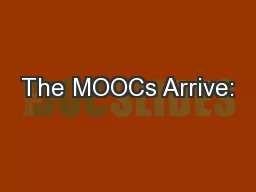PPT-MOOCs: hype or hope?
Author : lindy-dunigan | Published Date : 2016-05-26
Conflicting narratives in higher education policy Maureen W McClure University of Pittsburgh 1 Conflicting Narratives MOOC narratives run in divergent directions
Presentation Embed Code
Download Presentation
Download Presentation The PPT/PDF document "MOOCs: hype or hope?" is the property of its rightful owner. Permission is granted to download and print the materials on this website for personal, non-commercial use only, and to display it on your personal computer provided you do not modify the materials and that you retain all copyright notices contained in the materials. By downloading content from our website, you accept the terms of this agreement.
MOOCs: hype or hope?: Transcript
Download Rules Of Document
"MOOCs: hype or hope?"The content belongs to its owner. You may download and print it for personal use, without modification, and keep all copyright notices. By downloading, you agree to these terms.
Related Documents














